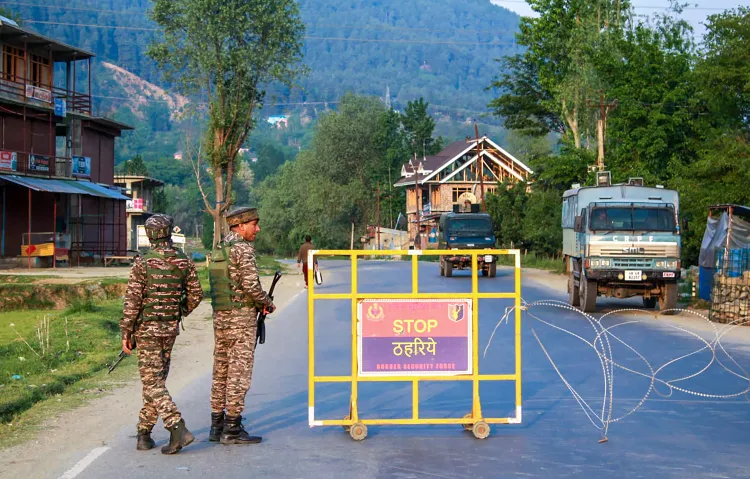Are False Probe Offers and Empty Peace Claims How India Dismantles Pakistan’s Pahalgam Dossier?

Synopsis
Key Takeaways
- India's strong rebuttal of Pakistan's dossier highlights ongoing tensions.
- Pakistan's history of denial and deflection is evident in its response to terrorism.
- Operation Sindoor represents India's decisive stance against terror threats.
- The claims made in the dossier are viewed as manipulative tactics.
- International scrutiny is essential in addressing regional security issues.
New Delhi, June 3 (NationPress) India has decisively countered Pakistan’s 20-page dossier that alleges New Delhi orchestrated a “false flag” operation in Pahalgam and initiated “naked aggression” through Operation Sindoor.
Officials in New Delhi have characterized the document as a desperate maneuver to shift global scrutiny away from Pakistan’s persistent support for cross-border terrorism.
According to senior security and diplomatic officials, the Pakistani dossier is fraught with contradictions, rejections, and a familiar narrative of victimhood.
“This is not the first time Pakistan has responded to evidence of terrorism with diversionary tactics. From the 26/11 Mumbai attacks to Pathankot, Pulwama, and Uri — each time we have presented definitive evidence, Pakistan has opted for denial rather than accountability,” stated a senior security official.
India has made it clear that expecting Pakistan to investigate the Pahalgam terror attack, where civilians were shot at point-blank range in front of their families, is like “asking a thief to investigate his own crime,” as bluntly articulated by foreign secretary Vikram Misri.
The Pakistan-based terror group The Resistance Front (TRF), a known affiliate of Lashkar-e-Taiba, publicly accepted responsibility for the attack, yet no action was taken by Islamabad.
Rather than addressing TRF or responding to intelligence leads provided by India, Pakistan has doubled down on its denial. “They asked for further evidence after a public claim of responsibility, which speaks volumes,” remarked a senior Indian diplomat.
“Their dossier makes no mention of any credible actions taken against TRF. Instead, they persist in promoting conspiracy theories and calling for a joint investigation, a notion that India finds absurd.”
Pakistan’s dossier also claims it exhibits “firm commitment to regional peace and stability” and repeatedly suggested a third-party investigation into the Pahalgam incident. Indian officials have dismissed these claims as laughable.
“It’s an affront to the intelligence of the international community. Pakistan’s version of peace involves hosting, financing, and sheltering those who commit mass murder across the border, only to then propose a joint investigation,” stated a defense source.
New Delhi has rejected all such proposals as disingenuous and manipulative. “These are not peace initiatives; they are public relations tactics aimed at obscuring complicity and evading accountability,” another official commented.
Far from being “naked aggression,” Indian actions under Operation Sindoor were a measured, intelligence-driven response to ongoing terror threats from Pakistan and PoJK.
Contrary to Islamabad’s assertions regarding civilian infrastructure damage, India maintains that it specifically targeted terror infrastructure, and even Pakistan’s own dossier has inadvertently confirmed that 28 terror-linked sites were struck, more than India initially revealed.
“The irony is striking,” remarked a defense analyst. “While accusing India of false flag operations, Pakistan’s dossier ultimately reveals just how effective and extensive the Indian strikes were, confirming hits in cities like Peshawar, Gujranwala, and Hyderabad (Sindh). This compelled Pakistan to call for an immediate ceasefire.”
India perceives the Pakistani document as merely another exercise in evasion and denial rather than a legitimate diplomatic or legal argument. “They harbor terrorists, refute evidence, demand joint investigations, and then accuse India of aggression when we act. This playbook is antiquated, and the world is observing,” stated a senior official.
In contrast, India’s message remains unequivocal: those who sponsor terrorism will face consequences, whether through international avenues or decisive and proportional actions. Operation Sindoor was not merely a military response; it was a strategic declaration that India will no longer tolerate terror sanctuaries across its borders, dossier or not.










